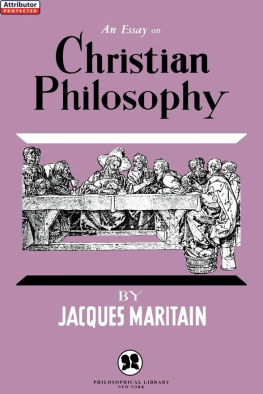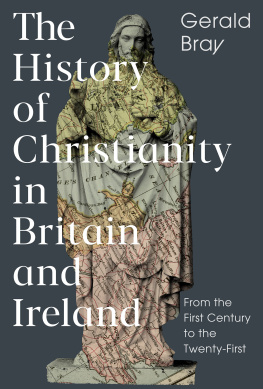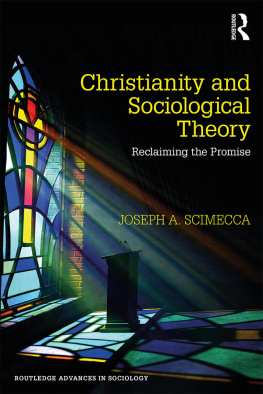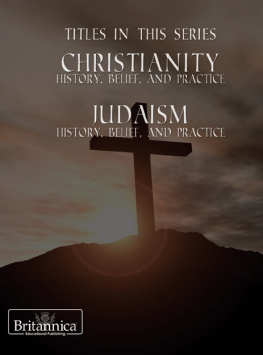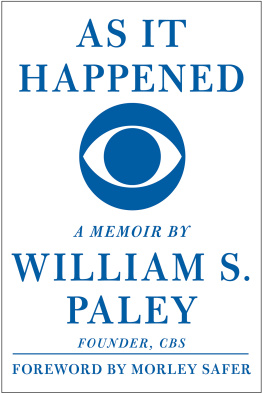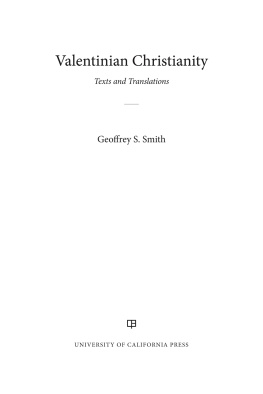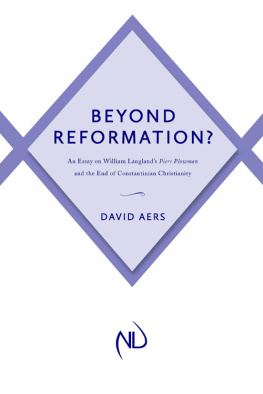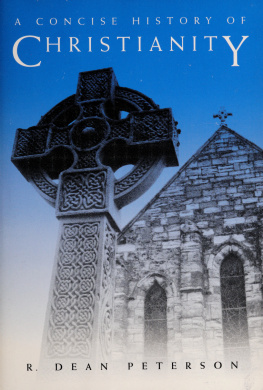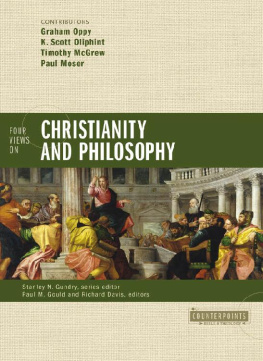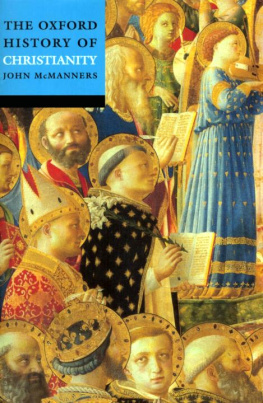Paley - Evidences of Christianity
Here you can read online Paley - Evidences of Christianity full text of the book (entire story) in english for free. Download pdf and epub, get meaning, cover and reviews about this ebook. year: 2012, publisher: Andrews UK, genre: Religion. Description of the work, (preface) as well as reviews are available. Best literature library LitArk.com created for fans of good reading and offers a wide selection of genres:
Romance novel
Science fiction
Adventure
Detective
Science
History
Home and family
Prose
Art
Politics
Computer
Non-fiction
Religion
Business
Children
Humor
Choose a favorite category and find really read worthwhile books. Enjoy immersion in the world of imagination, feel the emotions of the characters or learn something new for yourself, make an fascinating discovery.

Evidences of Christianity: summary, description and annotation
We offer to read an annotation, description, summary or preface (depends on what the author of the book "Evidences of Christianity" wrote himself). If you haven't found the necessary information about the book — write in the comments, we will try to find it.
Paley: author's other books
Who wrote Evidences of Christianity? Find out the surname, the name of the author of the book and a list of all author's works by series.
Evidences of Christianity — read online for free the complete book (whole text) full work
Below is the text of the book, divided by pages. System saving the place of the last page read, allows you to conveniently read the book "Evidences of Christianity" online for free, without having to search again every time where you left off. Put a bookmark, and you can go to the page where you finished reading at any time.
Font size:
Interval:
Bookmark:
EVIDENCES OF CHRISTIANITY
by
WILLIAM PALEY, D.D.
A New Edition
London: Printed by W. Clowes and Sons, Stamford Street
1851
This edited version, including layout, typography, additions to text, cover artwork and other unique factors is copyright 2012 Andrews UK Limited
This book is sold subject to the condition that it shall not, by way of trade or otherwise, be lent, resold, hired out or otherwise circulated without the publishers prior written consent in any form of binding or cover other than that in which it is published, and without a similar condition being imposed on the subsequent purchaser.
THE HONOURABLE AND RIGHT REVEREND
JAMES YORK, D.D., LORD BISHOP OF ELY
My LORD,
When, five years ago, an important station in the University of Cambridge awaited your Lordship's disposal, you were pleased to offer it to me. The circumstances under which this offer was made demand a public acknowledgment. I had never seen your Lordship; I possessed no connection which could possibly recommend me to your favour; I was known to you only by my endeavour, in common with many others, to discharge my duty as a tutor in the University; and by some very imperfect, but certainly well-intended, and, as you thought, useful publications since. In an age by no means wanting in examples of honourable patronage, although this deserve not to be mentioned in respect of the object of your Lordship's choice, it is inferior to none in the purity and disinterestedness of the motives which suggested it.
How the following work may be received, I pretend not to foretell. My first prayer concerning it is, that it may do good to any: my second hope, that it may assist, what it hath always been my earnest wish to promote, the religious part of an academical education. If in this latter view it might seem, in any degree, to excuse your Lordship's judgment of its author, I shall be gratified by the reflection that, to a kindness flowing from public principles, I have made the best public return in my power.
In the mean time, and in every event, I rejoice in the opportunity here afforded me of testifying the sense I entertain of your Lordship's conduct, and of a notice which I regard as the most flattering distinction of my life.
I am, MY LORD,
With sentiments of gratitude and respect,
Your Lordship's faithful
And most obliged servant,
WILLIAM PALEY.
PREPARATORY CONSIDERATIONS.
I deem it unnecessary to prove that mankind stood in need of a revelation because I have met with no serious person who thinks that, even under the Christian revelation, we have too much light, or any degree of assurance which is superfluous. I desire, moreover, that in judging of Christianity, it may be remembered that the question lies between this religion and none: for, if the Christian religion be not credible, no one, with whom we have to do, will support the pretensions of any other.
Suppose, then, the world we live in to have had a Creator; suppose it to appear, from the predominant aim and tendency of the provisions and contrivances observable in the universe, that the Deity, when he formed it, consulted for the happiness of his sensitive creation; suppose the disposition which dictated this counsel to continue; suppose a part of the creation to have received faculties from their Maker, by which they are capable of rendering a moral obedience to his will, and of voluntarily pursuing any end for which he has designed them; suppose the Creator to intend for these, his rational and accountable agents, a second state of existence, in which their situation will be by their behaviour in the first state, by which suppose (and by no other) the objection to the divine government in not putting a difference between the good and the bad, and the inconsistency of this confusion with the care and benevolence discoverable in the works of the Deity is done away; suppose it to be of the utmost importance to the subjects of this dispensation to know what is intended for them, that is, suppose the knowledge of it to be highly conducive to the happiness of the species, a purpose which so many provisions of nature are calculated to promote: Suppose, nevertheless, almost the whole race, either by the imperfection of their faculties, the misfortune of their situation, or by the loss of some prior revelation, to want this knowledge, and not to be likely, without the aid of a new revelation, to attain it; under these circumstances, is it improbable that a revelation should be made? Is it incredible that God should interpose for such a purpose? Suppose him to design for mankind a future state; is it unlikely that he should acquaint him with it?
Now in what way can a revelation be made, but by miracles? In none which we are able to conceive. Consequently, in whatever degree it is probable, or not very improbable, that a revelation should be communicated to mankind at all: in the same degree is it probable, or not very improbable, that miracles should be wrought. Therefore, when miracles are related to have been wrought in the promulgating of a revelation manifestly wanted, and, if true, of inestimable value, the improbability which arises from the miraculous nature of the things related is not greater than the original improbability that such a revelation should be imparted by God.
I wish it, however, to be correctly understood, in what manner, and to what extent, this argument is alleged. We do not assume the attributes of the Deity, or the existence of a future state, in order to prove the reality of miracles. That reality always must be proved by evidence. We assert only, that in miracles adduced in support of revelation there is not any such antecedent improbability as no testimony can surmount. And for the purpose of maintaining this assertion, we contend, that the incredibility of miracles related to have been wrought in attestation of a message from God, conveying intelligence of a future state of rewards and punishments, and teaching mankind how to prepare themselves for that state, is not in itself greater than the event, call it either probable or improbable, of the two following propositions being true: namely, first, that a future state of existence should be destined by God for his human creation; and, secondly, that, being so destined, he should acquaint them with it. It is not necessary for our purpose, that these propositions be capable of proof, or even that, by arguments drawn from the light of nature, they can be made out to be probable; it is enough that we are able to say concerning them, that they are not so violently improbable, so contradictory to what we already believe of the divine power and character, that either the propositions themselves, or facts strictly connected with the propositions (and therefore no further improbable than they are improbable), ought to be rejected at first sight, and to be rejected by whatever strength or complication of evidence they be attested.
This is the prejudication we would resist. For to this length does a modern objection to miracles go, viz., that no human testimony can in any case render them credible. I think the reflection above stated, that, if there be a revelation, there must be miracles, and that, under the circumstances in which the human species are placed, a revelation is not improbable, or not to any great degree, to be a fair answer to the whole objection.
But since it is an objection which stands in the very threshold our argument, and, if admitted, is a bar to every proof, and to all future reasoning upon the subject, it may be necessary, before we proceed further, to examine the principle upon which it professes to be founded; which principle is concisely this, That it is contrary to experience that a miracle should be true, but not contrary to experience that testimony should be false.
Now there appears a small ambiguity in the term "experience," and in the phrases, "contrary to experience," or "contradicting experience," which it may be necessary to remove in the first place. Strictly speaking, the narrative of a fact is then only contrary to experience, when the fact is related to have existed at a time and place, at which time and place we being present did not perceive it to exist; as if it should be asserted, that in a particular room, and at a particular hour of a certain day, a man was raised from the dead, in which room, and at the time specified, we, being present and looking on, perceived no such event to have taken place. Here the assertion is contrary to experience properly so called; and this is a contrariety which no evidence can surmount. It matters nothing, whether the fact be of a miraculous nature, or not. But although this be the experience, and the contrariety, which Archbishop Tillotson alleged in the quotation with which Mr. Hume opens his Essay, it is certainly not that experience, nor that contrariety, which Mr. Hume himself intended to object. And short of this I know no intelligible signification which can be affixed to the term "contrary to experience," but one, viz., that of not having ourselves experienced anything similar to the thing related, or such things not being generally experienced by others. I say "not generally" for to state concerning the fact in question, that no such thing was ever experienced, or that universal experience is against it, is to assume the subject of the controversy.
Next pageFont size:
Interval:
Bookmark:
Similar books «Evidences of Christianity»
Look at similar books to Evidences of Christianity. We have selected literature similar in name and meaning in the hope of providing readers with more options to find new, interesting, not yet read works.
Discussion, reviews of the book Evidences of Christianity and just readers' own opinions. Leave your comments, write what you think about the work, its meaning or the main characters. Specify what exactly you liked and what you didn't like, and why you think so.

